A Translation of Silence: The 2023 César Chávez Day Celebration
A student reflects on the power of words to foster connection, change hearts, and make a difference.
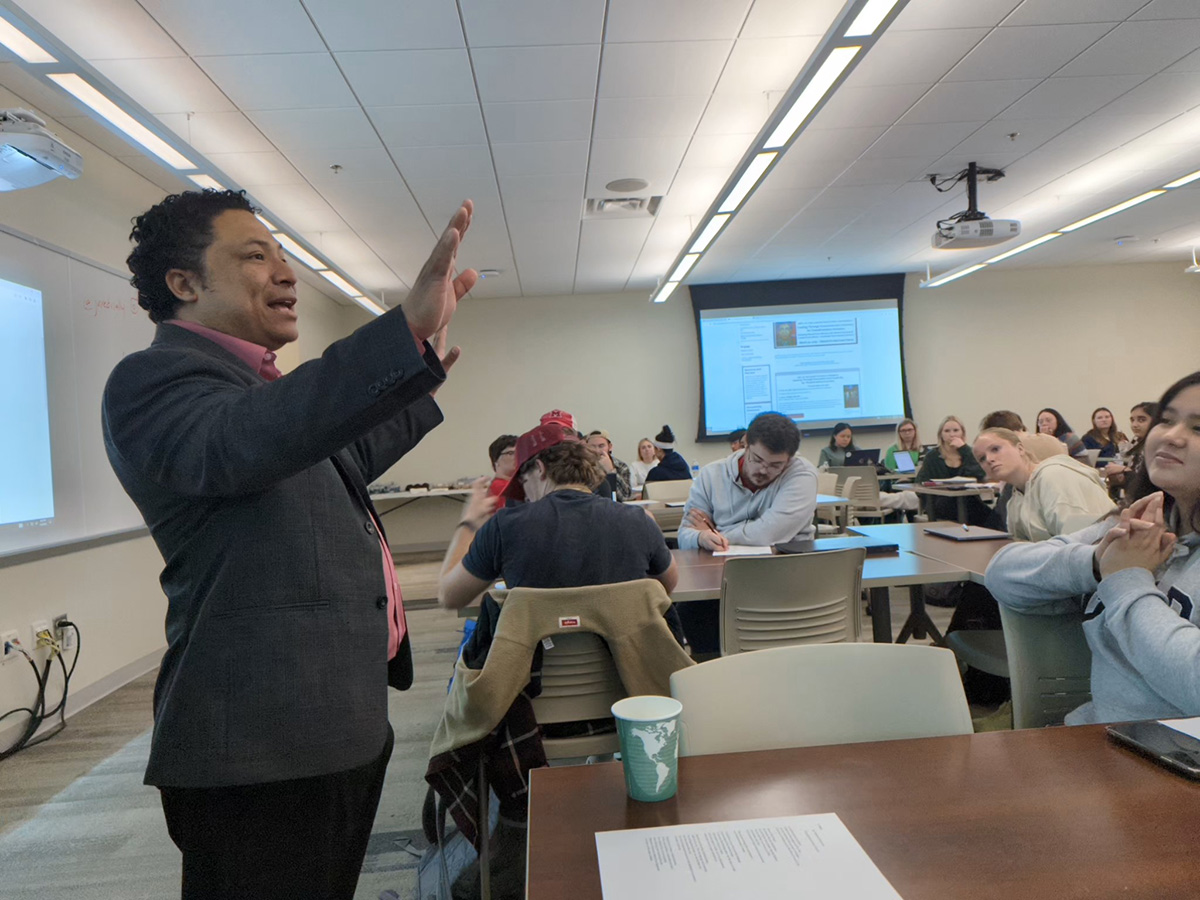
A Translation of Silence: The 2023 César Chávez Day Celebration
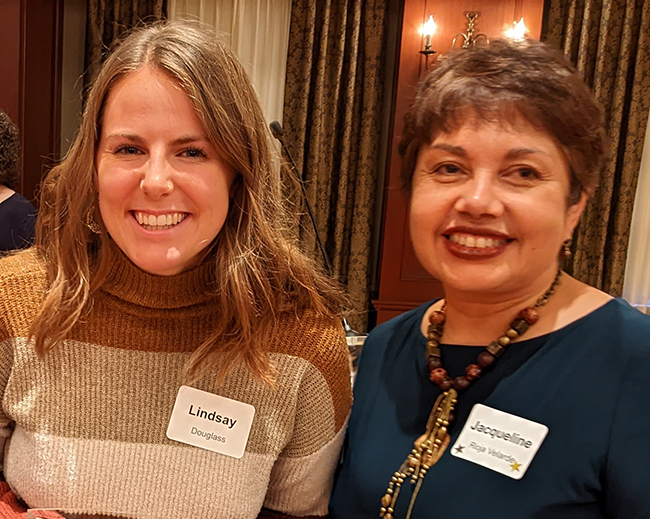 When I first heard about Global Initiatives’ 2023 César Chávez Day Celebration Program from my boss Jacqueline Rioja Velarde, I was hit with that feeling you get when you vaguely recognize a name or a face but you can’t quite seem to place it. “César Chávez… who is that again?” Maybe he was a legendary Mexican revolutionary I had learned about in history? Or maybe he was a famous painter whose work I had seen in an art museum growing up? Unfortunately, no matter how long I searched my brain, I couldn’t seem to remember.
When I first heard about Global Initiatives’ 2023 César Chávez Day Celebration Program from my boss Jacqueline Rioja Velarde, I was hit with that feeling you get when you vaguely recognize a name or a face but you can’t quite seem to place it. “César Chávez… who is that again?” Maybe he was a legendary Mexican revolutionary I had learned about in history? Or maybe he was a famous painter whose work I had seen in an art museum growing up? Unfortunately, no matter how long I searched my brain, I couldn’t seem to remember.
So I did the normal thing any college student would do: I Googled him.
And to my surprise, César Chávez was neither a war hero nor an iconic artist from a far off place; rather, he was a civil rights activist and labor leader who lobbied for the rights of farm workers here in the United States.
Looking at the pictures of César Chavez that filled my computer screen, it finally came back to me: I did vaguely remember the brief section about farmer unions we covered during the civil rights unit in my U.S. history class. But that was it. Outside of that one hour-long class, I hadn’t really heard anything else about César Chávez and the cause he helped champion across the nation.
As I exited out of the search engine, I felt confused by how little I knew about a movement that seemed so big. For decades, Chávez organized communities, led boycotts, and lifted the voices of exploited workers, specifically migrant workers, eventually leading to improvements in conditions and wages. Yet, I ashamedly couldn’t seem to place his name when my boss mentioned the César Chávez Day Celebration Program.
To me, that is why events and celebrations such as the César Chávez Day Celebration Program are so important: they educate the public, celebrate the impact important figures have had on society, and hopefully inspire others to follow in their footsteps.
Therefore, with this in mind, and a newfound appreciation of César Chávez and his legacy, I considered it an honor as the Global Initiatives Student Ambassador to help plan, promote, and implement this year’s César Chávez Day Celebration Program.
Words are also migrants
Led by Jacqueline Rioja Velarde, chair of the planning committee, and supported by a handful of students, faculty, and community partners organizations, Miami University has honored the legacy of César Chávez for the past ten years through a variety of programs including keynote speakers, student and faculty panel discussions, film screenings, and art exhibitions. However, for this year’s edition of the program, a new medium was presented as a way for students, faculty and staff, and community members to partake in the celebration of the values César Chávez spent his life promoting: the writing and sharing of poetry.
As part of the Across the Divide Conference: Leading Through Innovation and Creativity for Transformative Inclusion, the César Chávez Day Celebration Program was honored to bring Manuel Iris, a Cincinnati Poet Laureate Emeritus (2018-2020) and a member of the National System of Art Creators in Mexico (Sistema Nacional de Creadores de Arte de México). Throughout his career, Iris has been recognized and praised for his ability to express himself through language, learning, and writing, something he is passionate about encouraging others to do as well. In fact, his participation in the César Chávez celebration allowed him to do just this by hosting a workshop where he could motivate participants to explore poetry as a form of translation and to delve into their own poetic capabilities.
In his workshop titled “Words are also migrants: poetry as a translation of silence,” Iris discussed with students and faculty how writing helps us as we migrate through the human experience to translate the silences we encounter into words, allowing us to remember the moments we care most about and share the beauty of this world with others. Drawing from his own experience as a Mexican immigrant establishing roots in Cincinnati as well as his newfound role as a father, Iris exemplified how one could create deeply personal poetry that also connects to those who listen to it.
Participants in the workshop were asked to discuss their personal interpretations of provided poetry excerpts and then were encouraged to create their own poems ending with the following line: “And that is the closest definition I have to love.” As student after student stood up to bravely share their poems with the group, I was in complete awe of the art that can be made when people open themselves up to what their hearts have to say and believe that their voices are important.
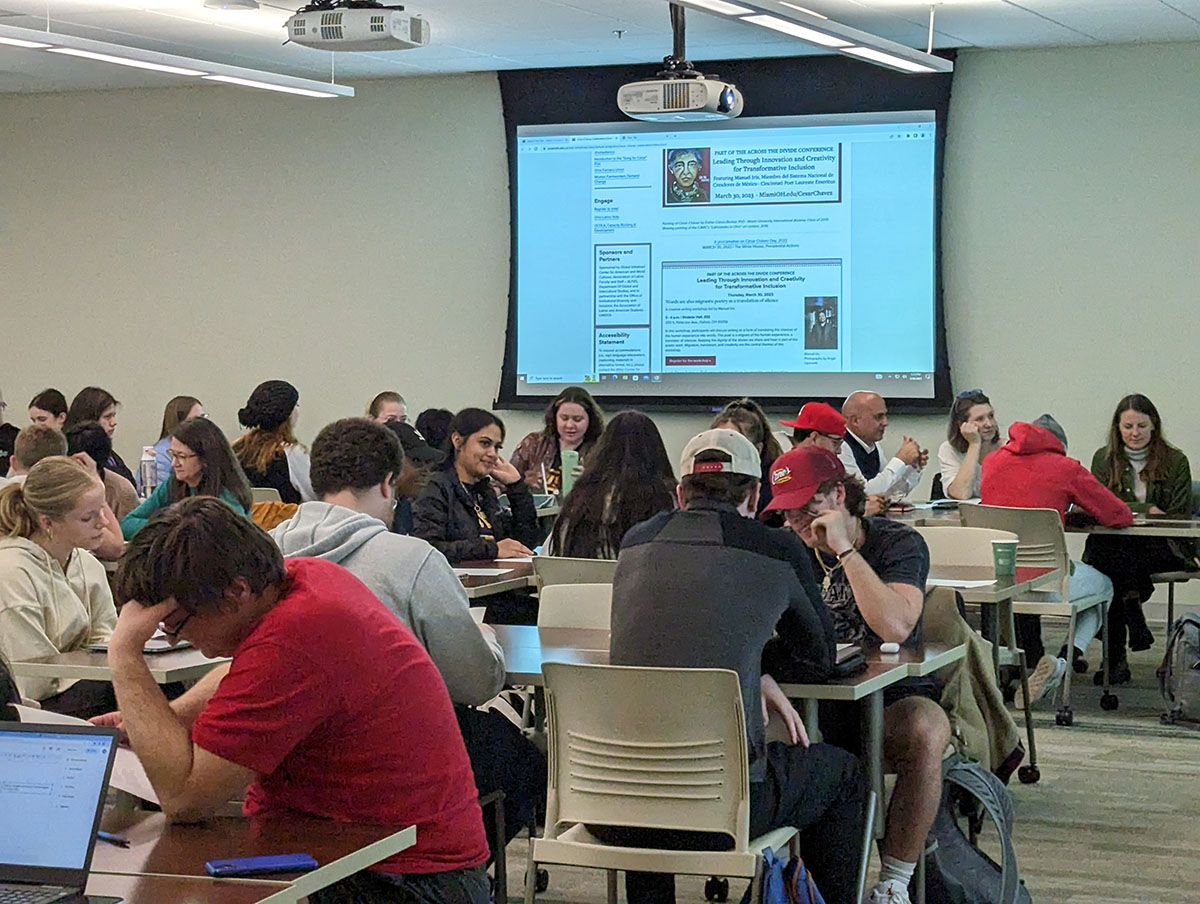
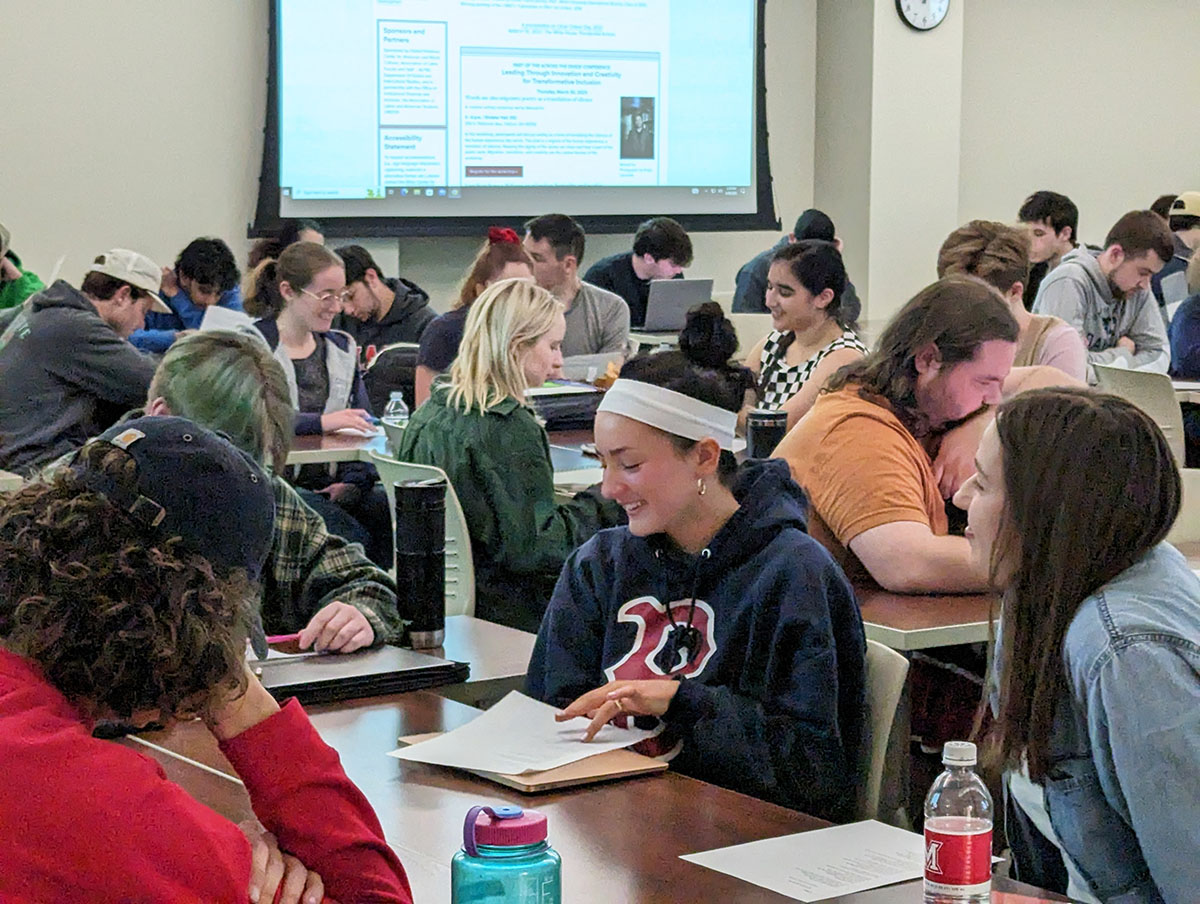
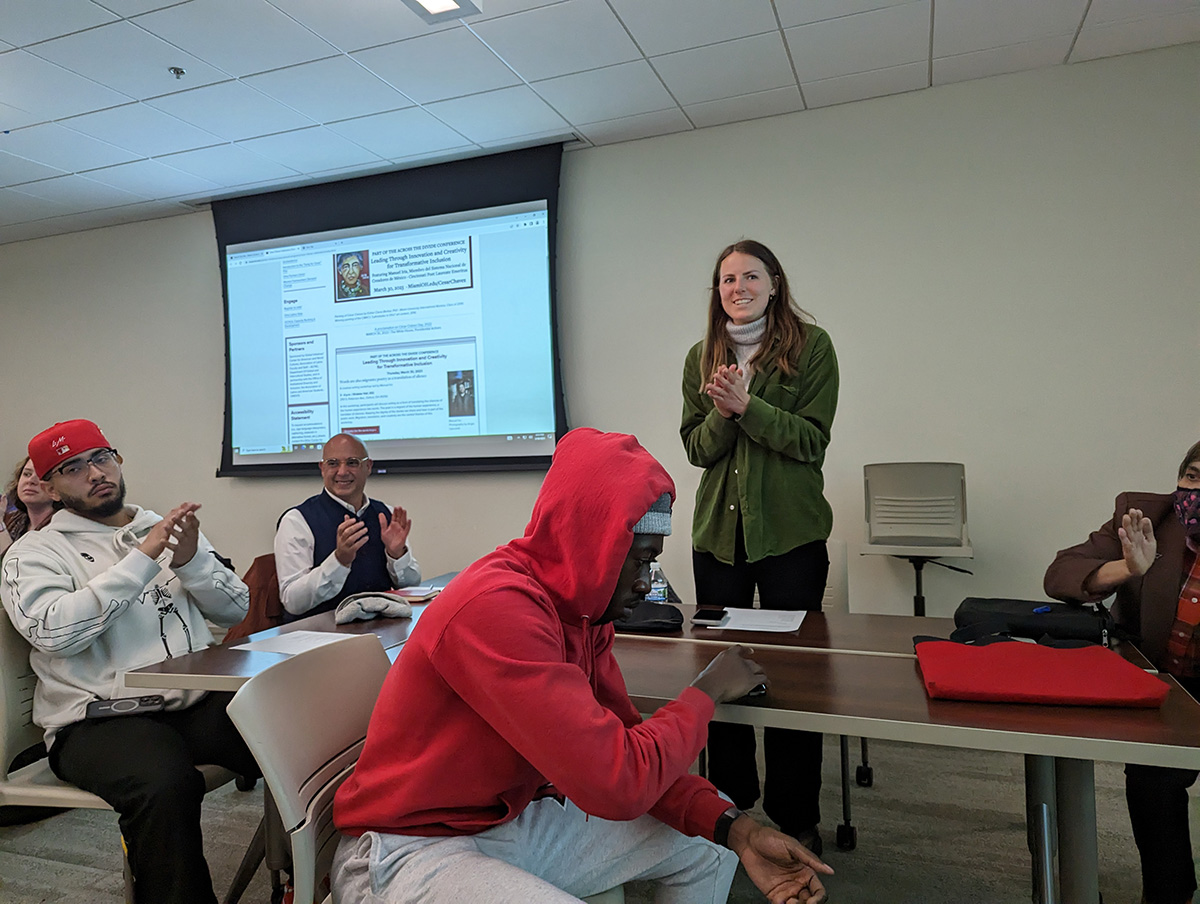
The reactions from the participants exemplify the power of the workshop. Riley Curtis, a student from Dr. Roxanne Ornelas’ Women, Gender, and the Environment geography course , said “[Manuel Iris] reframed my perspective on language and made me feel like I can be a poet, even though it has never been something I ever considered myself to be. He reminded us that poetry is a human right and we should all exercise it.”
Other students, who participated as part of the American Studies capstone with Dr. Damon Scott, commented on how the workshop, as well as the following lecture and poetry reading, “demonstrated the power of the arts to foster empathy and a respect for our common humanity” while also brilliantly incorporating the celebration of César Chávez’s legacy and raising awareness about migrant workers’ struggles for civil rights.
The power of poetry
For me, not only as the Global Initiatives Student Ambassador but also as a student, a participant, and a daughter of migrants, this event spoke to me on a deeply personal level. I never considered poetry to be a medium that I could adequately express myself in, let alone connect to others through. But as I sat down to write my poem ending in “And that is the closest definition I have to love,” I found myself sharing moments of silence I had never taken the time to translate before. Moments so beautiful I was disappointed I had never thought to write them down on paper and share them before. But now I have. And I can’t wait to continue to do so in the future.
Words are powerful. And that is ultimately what César Chávez demonstrated throughout his life as a community organizer and what Manuel Iris was able to communicate through his workshop. We all have a voice, and we have the right to raise it. Whether we are rallying people together to confront injustices or writing poems about the beautiful everyday moments we share with others, the words we are speaking are living, powerful beings that can foster connection, change hearts, and make a difference.
For those who were not able to attend, I would encourage you to write your own poem using the prompt given to us by Iris and see what your heart has to say. But as you find your own voice, do not forget about the importance of listening to the voices of others as well. As César Chávez once said, “We cannot seek achievement for ourselves and forget about progress and prosperity for our community.” Together, not alone, will we enact change.